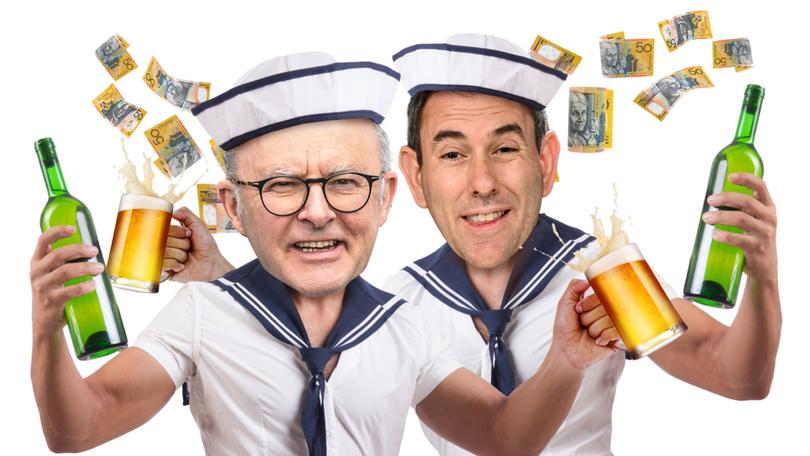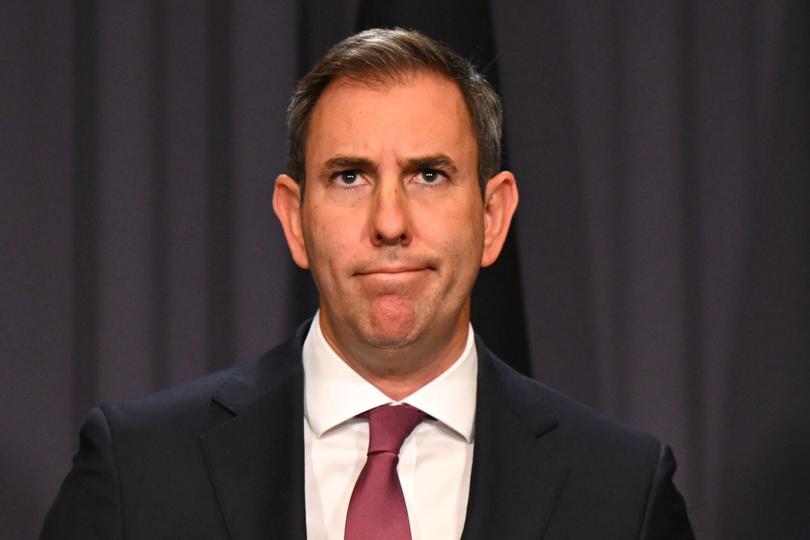BEN HARVEY: Jim Chalmers and Anthony Albanese are still spending big as the economy heads south
BEN HARVEY: Jim Chalmers and Anthony Albanese are spending like drunken sailors ahead of next year’s election, for fear they are forced onto the hustings during an economic recession.

Are we about to have another recession we have to have?
The once mighty Australian economy — for so long the envy of the world because of its seemingly endless run of year-on-year growth — is finally having a come-to-Jesus moment.
Having avoided recession during the global financial crisis and dipping into the red only fleetingly during the pandemic, Australia’s gross domestic product has been brought to its knees by a middle-aged woman with an honours degree in economics.
Sign up to The Nightly's newsletters.
Get the first look at the digital newspaper, curated daily stories and breaking headlines delivered to your inbox.
By continuing you agree to our Terms and Privacy Policy.Take a bow, Michele Bullock, you broke it good.
The dozen-or-so interest rate rises you smashed us with have done the job. We’ve stopped spending and are now living like destitute paupers.
Welcome to the world of journalism, dear readers.
With wallets and purses glued shut, the economy grew by an anaemic 0.3 per cent in the September quarter.
The only thing that kept us in the black was government expenditure.
Jim Chalmers and Anthony Albanese are spending like drunken sailors ahead of next year’s election, for fear they are forced onto the hustings during an economic recession.
Australian politicians are terrified of the R-word because we hardly ever have them.
The last real one was the one Paul Keating said we had to have in the early 1990s after the previous decade’s antics by four-on-the-floor entrepreneurs overheated the economy to the point we needed a hard reset.
We took our medicine back then and the economy (and the political careers of John Howard and Peter Costello) were better for it.
Recessions are quite common in other countries; part of the natural flow and something governments don’t welcome but are resigned to occasionally wear.
Not so in Australia, where it’s considered a clarion sign of economic mismanagement.
Losing a triple-A credit rating is bad but presiding over an economy that’s going backwards is a hanging offence Down Under.
It’s a harsh penalty because recessions are usually caused by events outside the control of politicians in Canberra.
Moreover, our fear of recession — which anyone with a passing interest in economics knows is defined by two consecutive quarters of negative growth — is overblown.
Let’s set aside the absurdity of the phrase “negative growth” and think about two scenarios.
In the first, the economy contracts by 0.1 per cent in the September quarter and again by 0.1 per cent in December.
In the second, the economy grows by 0.1 per cent in September but then contracts by 4 per cent at the end of the year.
What situation would you prefer?
So fearful are we of recession that we’re content to send future generations broke to avoid having to taste the medicine today.
We’re happy for Chalmers to keep spending money he doesn’t have (adding to that $1 trillion debt pile we’ve built over the past few years) so we can avoid the ignominy of registering two consecutive quarters of negative growth.

At the rate we’re going the national credit card will be positively smoking by the middle of next year because when an economy softens, so does government revenue.
When punters don’t spend at the shops, there’s less GST.
When businesses stop employing because there are no customers to serve, there’s less payroll tax.
When profits fall because there are cobwebs on the cash registers, there’s less company tax.
Will politicians crimp spending to align with the new revenue reality?
Hell no.
Canberra doesn’t do “restraint”.
Whoever wins the next election will likely govern with the help of the cross bench. And cross-benchers have pet projects that need to be financed.
Even if an absolute majority is achieved by a party, the outgoings won’t slow.
Ministers don’t play the long game. Their time in the sun is usually fleeting so they pull every leverage than can to leave their mark.
Who wants to be a transport minister that builds no roads or railways?
What’s the point of having an infrastructure minister if there isn’t a new sports stadium every couple of years?
Who applauds a health minister for not adding a medicine to the PBS?
Thus debt keeps growing — in absolute terms and as a share of GDP — and interest payments on that debt keep challenging the NDIS as the fastest-growing area of government spending.
The cycle can’t go on forever.
At some point the international bond market, which up until now has happily lent money to governments around the world, will call bullshit on the emperor’s new clothes.
When the music stops the landing is not going to be a soft one.
It can’t be because we will have used all our financial ammunition in the good times.
Believe it or not, these are still good times. Sure, the wolf is at the door but we’ve all got jobs and few people are losing their houses.
What happens when the wolf is in the room?
The lucky country could actually turn into that banana republic Keating warned us about.
